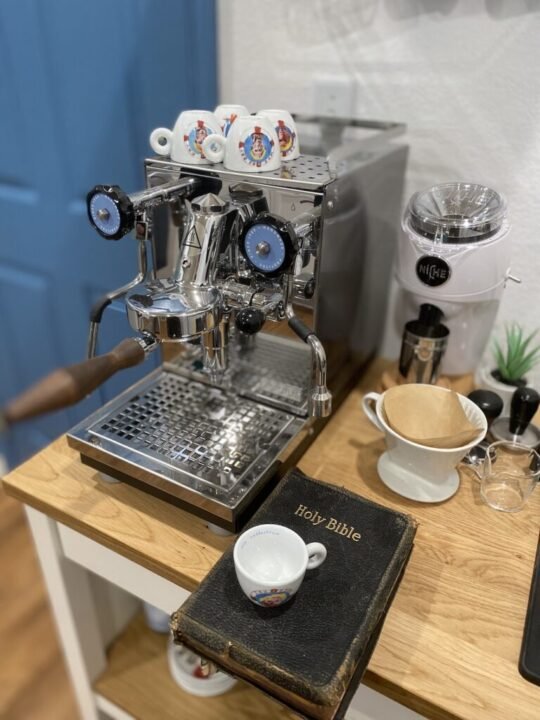For coffee lovers, few things compare to the rich, bold flavor of an espresso. Whether you’re a seasoned barista or a coffee enthusiast, owning an espresso machine can elevate your coffee experience to a whole new level. These machines allow you to perfect espressos, lattes, cappuccinos, and other coffee-based drinks with ease. In this ultimate guide, we’ll cover everything you need to know about espresso machines, from choosing the right one to understanding how it works, and tips on getting the most out of your espresso.
What is an Espresso Machine?
An espresso machine is a device used to brew coffee by forcing hot water through finely-ground coffee beans under high pressure. The result is a rich, concentrated coffee known as espresso, which serves as the base for a variety of popular coffee drinks. Unlike regular drip coffee makers, which rely on gravity to brew, espresso machines use pressure to extract maximum flavor from the coffee grounds, producing a small, but highly flavorful shot of coffee.
There are several types of espresso machines, ranging from manual models that require skill and technique to fully automated versions that take care of the process for you. In the next sections, we’ll break down the different types and features to help you find the perfect espresso machine for your needs.
Types of Espresso Machines
When it comes to choosing the right espresso machine, the options can be overwhelming. Below, we’ll discuss the different types of espresso machines available on the market, each offering unique features and benefits.
1. Manual Espresso Machines
Manual espresso machines are the most traditional type of machine, requiring you to control every aspect of the brewing process. You’ll need to grind the coffee, tamp it, and manually control the pressure during extraction. This type of machine offers the most hands-on experience and is often favored by professional baristas and coffee enthusiasts who enjoy the art of espresso-making.
Advantages:
- Full control over the brewing process.
- Ideal for those who love to experiment with different brewing methods and fine-tune their coffee.
Disadvantages:
- Requires skill and practice.
- Takes longer to make espresso compared to other machines.
2. Semi-Automatic Espresso Machines
Semi-automatic espresso machines offer a compromise between manual and fully automated machines. These machines automate the water pressure and temperature, but you still have to grind the coffee, tamp it, and monitor the extraction time. This gives you more control over the process while still offering some convenience.
Advantages:
- More consistent than manual machines.
- Offers a balance between control and convenience.
Disadvantages:
- Requires some skill and attention to detail.
- Needs regular maintenance to keep it running smoothly.
3. Automatic Espresso Machines
Automatic espresso machines take over even more of the brewing process, automatically controlling the water flow and volume. You only need to grind, tamp, and load the coffee into the portafilter. These machines are ideal for those who want a more hands-off approach to brewing but still want quality espresso.
Advantages:
- Consistent results with less effort.
- Easier to use than semi-automatic machines.
Disadvantages:
- Less control over the brewing process.
- Can be more expensive than manual or semi-automatic models.
- Super-Automatic Espresso Machines
For the ultimate in convenience, super-automatic espresso machines do it all for you. These machines grind the coffee, tamp it, brew the espresso, and even steam milk for lattes and cappuccinos. All you have to do is press a button, and the machine takes care of everything.
Advantages:
- Convenient and quick.
- Great for beginners or those with little time to spare.
Disadvantages:
- More expensive than other models.
- Less control over the flavor and extraction process.
Key Features to Look for in an Espresso Machine
When shopping for an espresso machine, there are several key features you should consider to ensure that you’re getting the best machine for your needs. Here are the most important factors to keep in mind:
1. Pressure and Pump Quality
One of the most crucial aspects of an espresso machine is its ability to generate enough pressure to brew espresso. The best espresso is brewed under high pressure, typically between 9 and 15 bars. Look for a machine that can consistently maintain this pressure for optimal extraction.
2. Temperature Control
Consistency in temperature is essential for great espresso. A high-quality espresso machine will have a stable heating system that ensures the water is at the correct temperature (around 190-200°F) for optimal extraction. Machines with PID (Proportional-Integral-Derivative) controllers are known for precise temperature control.
3. Grinder Compatibility
Many espresso machines don’t come with built-in grinders, so it’s important to pair your machine with a high-quality burr grinder. Freshly ground coffee is crucial for making good espresso, and a burr grinder ensures that the grind is uniform, which helps with proper extraction. Some espresso machines are compatible with grinders that can be attached to the machine itself, making the grinding and brewing process even more seamless.
4. Ease of Cleaning
Espresso machines require regular cleaning and maintenance, especially if you want to keep your espresso tasting fresh. Look for a machine with easy-to-remove parts, such as the drip tray, portafilter, and milk frother, that can be cleaned quickly. Some machines even offer automatic cleaning cycles for added convenience.
5. Milk Frothing Capability
If you enjoy lattes, cappuccinos, or other milk-based drinks, the espresso machine you choose should have a reliable steam wand or automatic milk frother. This will allow you to froth milk for a creamy texture and rich flavor. Some machines come with a built-in milk frother, while others may require you to froth manually.
How to Use an Espresso Machine
While espresso machines can vary depending on the type, the general steps to make espresso remain the same. Here’s a basic guide on how to use your espresso machine to brew a delicious shot of espresso:
- Grind Your Coffee: Freshly ground coffee beans are essential for a rich and flavorful espresso. Use a burr grinder to get a fine, consistent grind that’s suitable for espresso brewing.
- Preheat the Machine: Turn on your machine and allow it to fully heat up before brewing. This ensures that the water is at the ideal temperature for extraction.
- Tamp the Coffee: Once the coffee is in the portafilter, use a tamper to press the grounds evenly and firmly. Proper tamping is key to ensuring even extraction.
- Brew the Espresso: Attach the portafilter to the machine and start the brewing process. A good shot of espresso should take around 25-30 seconds to extract.
- Enjoy Your Espresso: Once the espresso is brewed, serve it immediately. For added flavor, you can pair it with steamed milk for a latte or cappuccino.
Choosing the Best Espresso Machine for You
When selecting an espresso machine, the right choice depends on your personal preferences and how much time you want to dedicate to making coffee. Here are some tips to help you make an informed decision:
Beginner:
If you’re new to espresso-making, consider a semi-automatic or super-automatic espresso machine that simplifies the process. The Gevi Espresso Machine is a great choice for beginners due to its user-friendly features and consistency.
Intermediate Barista:
If you’re comfortable with the basics but want to experiment with your coffee, a semi-automatic espresso machine will give you more control without being too complicated. The Gevi Espresso Machine offers a balance of control and convenience, making it perfect for this level.
Expert Barista:
If you’re a true coffee connoisseur who enjoys the art of brewing, a manual espresso machine might be right for you. These machines offer full control over every aspect of the brewing process, allowing you to experiment with different grind sizes, tamping pressures, and extraction times.
Why Choose the Gevi Espresso Machine?
The Gevi Espresso Machine stands out for its exceptional quality, ease of use, and customizable features. Whether you’re just starting your coffee journey or are a seasoned barista, the Gevi Espresso Machine offers the perfect balance of convenience and performance. It comes equipped with a built-in grinder, precise temperature control, and an automatic milk frother, making it one of the top choices for both espresso aficionados and beginners alike.
Conclusion
An espresso machine is an investment that can greatly enhance your coffee experience. Whether you’re looking for a simple machine to brew your daily espresso or a more advanced model for crafting specialty coffee drinks, the right machine can make all the difference. The Gevi Espresso Machine provides high-quality performance, ease of use, and customizable features, making it an excellent choice for any coffee lover.





